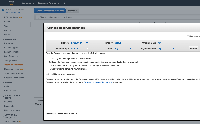Details
-
Type:
Task
-
Status: Closed (View Workflow)
-
Priority:
Major
-
Resolution: Done
-
Affects Version/s: None
-
Fix Version/s: None
-
Labels:None
-
Story Points:0.25
-
Epic Link:
-
Sprint:Spring 7 : 13 Apr to 24 Apr
Description
A few months ago you found some information about how to reduce costs by changing a setting during EC2 creation. It had something to do with the length of time the EC2 would be available. By setting a projected end date for the EC2's existence, we could reduce costs.
I don't recall the details. Can you explain in more detail here?

AWS offers in all 3 type of instances
On-Demand
Spot
Reserved
Each differs from the other with respect to the costing and management. For now what we are using everywhere is On-Demand with direct cost to usage model.
spot instance work more like auctioned price....we set a bidding price and if the quote is achieved then the spot instance is ours...until a higher quote is active, in that case, we get a warning of 10 min and then spot instance ceases to exist
Reserved instances - These were designed for an organization which want to have production systems that are long term(3-6 years). In On-Demand the cost becomes too high if the server involved is huge.
Reserved Instances have less cost like 60% cost reduction (up to 72% off On-Demand)so this allows us to have servers of higher config to serve more content at a reduced cost.
How it works I believe is once a server is provisioned for 3 years. AWS manages the infra in advance so in the background they know that this will be used for longer durations so the hardware provided is more dedicated with resources that need lesser maintenance.
OnDemand keeps changing so more optimizations on hardware are needed. Although they are VM's they still run on fleets of distributed hardware servers.